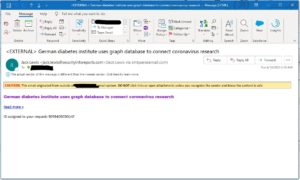Hackers have been exploiting our fear and curiosity about COVID-19 for as long as the novel coronavirus has existed. The rise in COVID-19 cyber attacks should come as no surprise. Like all things related to this pandemic, the news about hacks and threats is coming almost too quickly and frequently to digest. We’ve got your roundup of the top COVID-19 cyber attacks and threats so you can protect your business during this difficult period.
Same Song, Different Verse
Attackers are repackaging well-known phishing attacks in a coronavirus wrapper. Barracuda Networks reported a 667% increase in coronavirus-related email phishing attacks from the end of February to the end of March.
A “vast number” of new URLs with coronavirus keywords have been registered according to research cited by Forbes. These domains are used to steal information or infect computers with malware. The bottom line is that any email that purports to contain COVID-19 or coronavirus news, cures, updates, or maps should be treated with extreme caution.
Phishing attempts may also play on other cultural trends of this unsettled era. Watch for emails that appear to come from airlines offering refunds. Verify links before clicking. Or, better yet, go directly to the airline’s site and log into your account. Other phishing attempts may offer sales of masks or other personal protective equipment. Sadly, counterfeit emails seeking charitable contributions are floating around too. As always, verify that a charity is real before clicking on any links or handing over your credit card information.
Zoom Doom
Stories of “Zoom-bombing” have spread almost as quickly as the story of a woman who turned herself into a potato during a video conference. Disturbing meeting interruptions add to the sense of fear and chaos of this time. But hackers aren’t stopping there. They’ve been busy creating 1,700 (and growing) new domains with the word “zoom” since January. These sites are used to spoof Zoom software downloads. Typically these fake sites include the Installcore application that loads your device with unwanted apps.
Employee Portal Replication
On the more sophisticated end of the spectrum are remote employee portal scams. This kind of attack is carefully planned and executed. A skilled hacker researches replicates the remote employee login page of a prominent business or political entity. Then an unsuspecting employee enters their credentials, giving them away to the hackers. The World Health Organization was targeted with this kind of scam in March of 2020. Luckily, the attempt appears to have failed.
Hospital-Targeted Ransomware
Hospitals are under enormous strain during the COVID-19 outbreak. Their critical care divisions are overrun with patients. But their elective procedures have dwindled to near zero. Hospital administrators are struggling to balance both staffing requirements and revenue decreases. Unfortunately, some hackers see this as a ripe opportunity for ransomware attacks. (Though it should be noted that some ransomware gangs have called for a ceasefire during the pandemic.)
Good News
One thing hasn’t changed since the novel coronavirus rolled onto the scene: the methods of prevention and protection. As always, training your staff to be cyber alert is the single most crucial step to avoiding cyber crime victim-hood. Reread our post on avoiding phishing attacks for a refresher. If you feel like you’re a likely target for ransomware (and who isn’t?), check out our post on prevention and response. And, finally, kick your five worst digital habits.
Is your business experiencing an uptick in COVID-19 adjacent cyber attacks? Does your staff need awareness training while working remotely? Please reach out to Asylas at info@asylas.com or 615-622-4591. Or complete our contact form. We respond to every message and are eager to help you improve your security stance.





